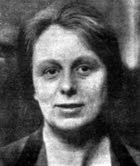The Mary Quaile Club – a Manchester-based working class history and politics discussion group – has launched a fund raising campaign to put on a play about the life and campaigning work of the trade unionist Mary Quaile. The play will be called “Dare to Be Free”.
Mary was born in Dublin in 1886, one of nine children. Her father James was an active member of the Brick and Stone Layers Union in the city, but, like many Irish workers, moved to Manchester for work. Mary herself went to work at the age of 12 as a domestic, a familiar path for many Manchester Irish women who worked in the houses of the rich.
By 1908 she was a cafe worker in one of the many establishments in the city of Manchester. Cafe work was not pleasant or well paid. Mary was not prepared to accept the poor pay and conditions and set up a Cafe Workers trade union, starting her lifelong commitment to trade unionism. In 1911 she was taken on as Assistant Organiser by Manchester and Salford Women’s Trades Council, working to organise the poorest paid women in the city. In 1914 she became the main organiser.
During the First World War Mary worked to improve pay and conditions for the thousands of women now working in the war industries, but was also was one of the brave people who spoke out against the war. Not an easy task, particularly as at least one of her four brothers was conscripted. When he was invalided out she became his carer.
After the war Mary became the national women’s officer for the Transport and General Workers’ Union and in 1923 she was elected to the General Council of the TUC, making her one of the most prominent women trade unionists in Britain. In April 1925 Mary went to the Soviet Union as part of a TUC delegation, spending four months travelling across the country and finding out about the new socialist society.
During the General Strike in May 1926 she spoke at rallies of striking workers, including one in Platt Fields Park, Manchester. In her later years she was a JP and Treasurer of Manchester Trades Council. In 1951 she was awarded the TUC Silver Medal for her services to trade unionism.
Mary died in 1958. Her obituary in the Manchester Guardian said: “her determination to get trade unionism for women accepted was often met with jeers, boos, rotten apples, and threats of violence. She spoke at hundreds of factory gate meetings in both the East End of London and Manchester; she never betrayed any sign of fear when faced with hostility. Her warmth and lovable personality won for her many friends in the labour and trade union movement.”
Bernadette Hyland, speaking for the Mary Quaile Club, said, “We feel that in this era of low pay, zero hours contracts and employers refusing to recognise trade unions, we have gone back a century: Mary would recognise many similarities with her own times. We think that putting on a play will be a marvellous way of making people more aware of Mary’s life and her contribution to trade unionism and we hope that it will inspire today’s activists for social justice, trade unionism and equality. Mary’s view was that if you want things to change for the better, you have to get up and do something about it”.
Sharon Hutchinson, North West UNITE Women’s and Equalities Officer said of Mary, “Mary Quaile was a woman ahead of her time. She is a shining example to women of today, showing how anything be achieved if you have the determination and commitment. I know the women of my union are proud that she is a part of our history.”
The play will be premiered at Manchester Trades Council May Day events in 2016 and a financial appeal has now been launched to raise £11,500 to get the play written and produced. The play project has already been supported by the BECTU, Professional Footballers’ Association, National Union of Journalists, National Union of Teachers, UNITE, and the historians Margaret Ward and Sheila Rowbotham.
Donations may be sent to the Mary Quaile Club c/o 6 Andrew Street, Mossley, OL5 0DN







